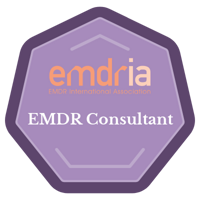
Consultation
General Consultation
I offer consultation that includes case consultations, general practice guidance, complex trauma support, crisis situations, and in the integration of EMDR with IFS. Online consultation can take place no matter where you are located so I work with clinicians in many locations. For more specifics about my general approach, see the article to the right called “Choosing a Consultant.”
IFS and EMDR Consultation
I am Level 3 trained and certified in IFS and have assisted in numerous IFS trainings as a PA. I provide IFS consultation for both IFS level-1 trained therapists and IFS-informed therapists, as well as therapists who want to learn IFS but have not had formal training. I am working on getting approved to provide IFS hours for my consultation as an IFSI Approved Consultant.
I am also an EMDRIA-approved EMDR consultant and can provide consultation hours towards certification. I work with EMDR therapist who work with complex trauma cases and want to integrate somatic, relational, and parts work practices into their EMDR work. I have consulted under Arielle Schwartz PhD for more than 10 years and follow her work closely.
Complex Trauma Consultation
I specialize in consultation with therapists who have training in trauma-specific modalities like IFS and EMDR but who are struggling or getting stuck with complex PTSD cases. I have specialized in complex PTSD (CPTSD or developmental trauma) for many years and myself experienced and worked through my own symptoms of complex PTSD (though recovery is a lifetime prospect!). I have done myriad trainings with experts in this area and have integrated a number of different approaches. For example, I am an EMDRIA consultant and a certified IFS therapist. My original training and theoretical framework was in relational psychodynamic therapy. I have worked under the guidance of Arielle Schwartz, PhD since 2014, herself an internationally-renown expert in integrative methods and somatic therapies to treating complex PTSD (CPTSD).
The reason I have gone into depth into several approaches to treating complex PTSD is that different clients respond to different approaches, and each of these approaches has something important to offer. I am currently providing group consultation to therapists looking to integrate EMDR, IFS, somatic and/or integrative approaches.
Learning the mechanics of treatment modalities that work with complex PTSD can be challenging, and I can help you learn them with teaching, coaching and skill building. More importantly, though, I help clinicians navigate the relational dynamics that come into play with complex PTSD that are often the source of client’s and therapist’s sense of being “stuck in the muck.” Relational dynamics are the intersection of thoughts, feelings, behaviors, and histories (parts) that arise in the relational space between the therapist and client. This includes how you, the therapist, show up in the room with the client. What parts of your history are activated, what parts of you show up with the client? Your presence is relevant and important.
Complex PTSD almost inevitable brings out unhealed parts of us when we as therapists work with it. Protective parts within our clients can often be masters at finding our wounds, and they need to do this to see if they really can be safe with us. Our own relational issues, hurts, sore points, and unresolved relational traumas are frequently and almost inevitably triggered in the work. And in some ways need to be in order for authentic relationship and relational healing to occur between the therapist and the client. This is because client parts that were relationally injured in childhood (and have strong unhealed wounds related to attachment trauma) need to feel safe with the therapist’s system of parts.
Self energy, the most important concept in the IFS model, offers a way for therapists to be with complex PTSD that promotes safety and healing. Knowing and being in Self is the most important factor for therapeutic work of any kind, but especially crucial with clients with relational trauma. Many good therapists who work with complex PTSD have strong Self energy. However, even when we do have strong Self energy, it is not uncommon for our parts to get triggered when working with the attachment trauma of complex PTSD cases, partly because client protectors can be very good at detecting and at times triggering our own unhealed parts and issues.
Relational psychodynamic therapy, along with IFS, offers a way to intuit and perceive the relational space between therapist and client and what happens in that space by placing special attention on the internal experiences of the therapist as they are working with the client. Though EMDR is an excellent model of working with traumatic memories, it does not offer much in the standard protocol to address this, and this is why it can fall short as a stand-alone model when working with complex PTSD (CPTSD).
I provide consultation that helps clinicians and therapists build skills in EMDR, parts work and IFS. I also help them identify and get comfortable with the relational dynamics and interactions between client’s and therapist’s parts that characterize therapeutic relationships. This enables the therapist to stay in Self and identify the healing work they can do outside of consultation.
If you are interested in consultation with me, please contact me for a free consultation to get to know me, my consultation approach, and how we might work together.


